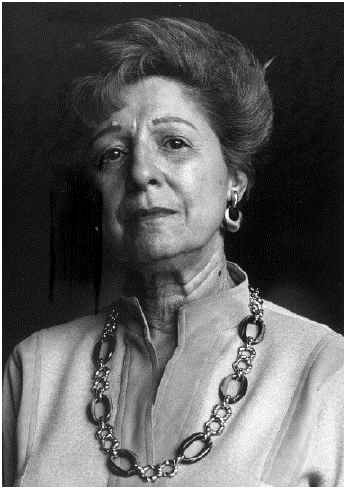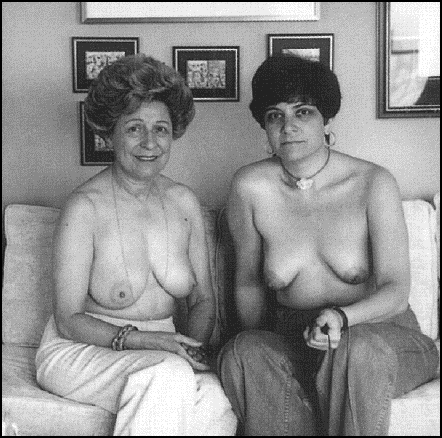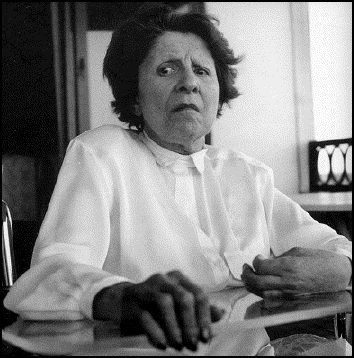Mother exPosed
Gay Block
(University of New Mexico Press)

- My first series consisted of portraits of people who were friends of my parents, mostly affluent, reform Jews who lived in Houston. The camera enabled me to enter these peoples homes and hear the stories of their lives ... The camera made me different from Mother even as it gave me access to her. It occurred to me much later that no matter who was in front of my camera, I was always photographing Mother."
Gay. I didn't learn love from you...I don't remember you touching me...
Bertha Alyce: Now I really think you've had too much psychoanalysis, Gay.
Gay: And you had too little, like none.
At the very beginning of the book, there are opening shots of two of her mothers' friends, bitching about the fact that Gay has to do this book at all: "The only question I have is, Why are you writing this book?" says Jean Kaufman, ancient, serious, white perfectly set hair, rheumy eyes, Virginia Slims in hand. "I don't know whether there was something you felt you had to be forgiven for, which flashed through my mind. Maybe you have some guilt?"
"I can't understand it," says Sabina Block, another of her mother's friends, huge thick octagonal glasses, huge earrings, tight mouth. "I can't understand this project. I used to understand you pretty good, Gay. This is nuts! It really is."
Then come several photos from 1973, sixty-year-old Bertha Alyce facing the camera together with Gay:
I suggest we pose bare-breasted. You like the idea, even want me to take some pictures of you alone.
Then you say it. Again. I knew you would.
"It's too bad your breasts aren't as pretty as mine."
This one is impossible to pigeon-hole. It is also impossible to leave alone. Pick it up, leaf through it, put it down, pick it up, look through it again, then, finally, start at the beginning, go at it page by page, merciless as it is.
And this is what happens: we get to experience year-by-year the tumult of living as daughter to one who some describe as beautiful, "the most generous person I ever met in my life." Too, a flirt, a queen, selfish, and, according to one, "she reminds me of the movie, The Three Faces of Eve."
As always there is the dialogue --- or, better, the monologue: Gay's words reversed on the background of the shots of her mother. In one, talking about her mother's affair from 1966 - 1974, behind the back of husband #2, with one seen here in a blurred out photo, referred to merely as D. K.:
You turned our family into an embarrassing soap opera.
Silence. Characteristically, you don't respond. But now, ten years after your death, I see the words on your face: "Who are you, daughter of mine, so relentlessly judgmental?" Yes, who was I? How could I? Why did you have to die for me to stop judging you?
The photographs and the writing come together in a spiral of images and words spun out of hurt and love and pain and the sheer weirdness of it all --- being born of a powerful charming flirtatious woman, one who could only love men. Thus Gay growing up a girl with a passionate man-lover for a mother --- knowing from afar that she will never able to let that part of Bertha Alyce, the part of her inside, alone --- at least until mother, was in pain:
After the stroke, finally I could see her beauty. She was more in touch with herself and more accessible to me. When I entered her apartment, I even thought I saw her eyes light up as if they were saying, "I love you." I felt this, certainly, but not deeply. Distance, perhaps even anger, had become my habit.
Mother didn't object to my photographing her, in spite of her vanity, in spite of the fact that she felt she had lost her looks. Perhaps she hoped these pictures would live after her, or perhaps she just couldn't say no to me.
This reminded me so much of my own up-and-down with my own mother, one who could be craven and childish, and a moment later, charming, funny, winning, easy, a great storyteller. One of my friends first met my mother at my daughter's wedding, spoke French with her (Mum studied in Switzerland for a couple of years) for hours on end. And she, my friend said, "You're so lucky! What a wonderful woman!" I said, "Yeah. Just try growing up with her."
Mother exPosed also brought regret. That I ran away, as far as I could from the woman who bore me into the world. I could have --- if I were only brave enough --- done what Gay did. Keep after her. Talk, adult to adult. Use something, anything (pictures, words) to bring her up: for this is a how-to on bringing up one's own mother. To love. Or to despair.

We know that Gay is an artist, and we learn from Mother exPosed that she is a damn good one. She designed the original showing at the museum then put it all together in this astonishing book. The power of it lies in the tension: the tension between Gay and Bertha Alyce; between Gay and those friends of her mother about doing all this ("Why are you writing this book?" Jean Kaufman, friend); the tension between Bertha and her friends ("She thought she was better than everybody else. She may have been richer, she may have had better clothes, but I'll be damned if she was a better person than I was." Jean Kaufman, friend)
There is another potent dynamic here between pictures and words. For example, there is a seventeen frame entr'acte, right smack dab in the middle of the book, of Gay fighting with her lover about (1) reading at the table, (2) using bug spray, (3) whether their dog should have puppies, (4) why she reads so slowly.
It's a mini-masterpiece: simple captioned home photos revealing the tension of living together with someone you love, but also the pain that comes from living with another's baggage: the two of them under the shadow of Gay's eternal, never-resolved battle with her mother.
There is a third and most peculiar force in Mother exPosed. It is that we, as readers, despite Gay's bitter words, cannot help but fall in love with Bertha Alyce. She's funny. She's smart. She's pretty. She's dignified. She is always --- except there at the very end, in the nursing home --- open and filled with smiles so that at the very end, when we see her lying in her casket, we are saddened that such a fireball is now gone.
If you and I had gone to a party in Houston while Bertha Alyce was around, I'll bet we'd have gotten into to conversation with her, and I'll bet she would have charmed the pants off of us. She's a flirt, like they say, and some of us are pushovers for flirts. She even flirts with Gay, who comes off in this volume as a bit of a sourpuss. She takes it all so seriously. How would you deal with a daughter who was always pecking at you like some angry duck? Cranky daughter says, "Let's take some pictures of us together, topless," and mother says, "Sure, why not?" --- and promptly takes everything off.
And always (unlike long-suffering Gay) she smiles brilliantly at the camera (the camera being Gay) and even at one point tells an obvious lie, which even she doesn't believe: "It's too bad your breasts aren't as pretty as mine."
It's a joke, Gay. Don't you get it? Even now? It's a throw-away. It's one of those smart-ass comments that people like her always throw out. Bertha Alyce didn't believe it. She's just cranking up her Gay-meter. She knows you've always been so serious, Gay: "too much psychoanalysis." You remember when she told you that you were "too fat" as a child. Well, those old family photographs pictures here do show you to be a bit plump; maybe she said it, but howcum you never forgot that, of all her lines over all the years? We suspect you're missing something very important about mother.
Here's a lady who never hid from your lens --- the one on your camera, the one in your head. You were married, briefly; you have children. When you're sixty, will you let your own child take shots of you buck-naked, getting out of bed? Or after a face-lift? Or after a stroke, when you can barely sit straight in a wheelchair?
 Bertha Alyce is a gas. I wish I had known her. No wonder some guy wanted to have an affair with her when she was in her mid-fifties. She was a hell of a charmer, even when someone is pecking at her.
Bertha Alyce is a gas. I wish I had known her. No wonder some guy wanted to have an affair with her when she was in her mid-fifties. She was a hell of a charmer, even when someone is pecking at her.
You were always pecking at her, Gay. Even when you were a five-year-old. Someone tells you that you look just like your mother, and you come back: "I don't want to look like my mother. I don't like my mother." Always pecking at her. Never could stop. Until she was in the grave.
When we get beyond your words, we finally figure out that Bertha Alyce was a kick.
Which, apparently, you still don't get.
Lighten up, Gay.
- Note: This volume comes complete with a DVD. I don't have a player, but I'm going out to get one ASAP. The DVD shot shows Bertha Alyce in a bubble-bath, smiling up at me. I wouldn't want to miss that for the world.